Gray Hat: Hooerhouse America and an Appreciation of the Peculiar Heroism of One Mister Jonah Hex
The last Western hero in comics was a disfigured bounty hunter, a man of dubious moral fiber who brought pain and death wherever he went. Long after every other cowboy hung up his sixguns, he rode on. He lasted because he brought something to comics that no other hero did, and he brought it well.
------------------
Little Bill Daggett: I don't deserve this... to die like this. I was building a house.
Will Munny: Deserve's got nothin' to do with it.
Little Bill Dagget: I'll see you in hell, William Munny.
Will Munny: Yeah.
--Unforgiven
-----------------
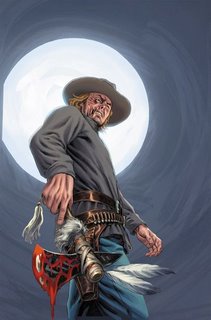 Jonah Hex was a killer. He’d kill to fulfill his job, and often he killed to carve out a little justice. Yet there’s a difference between him and the killer vigilantes of comics set in the modern era, such as the Punisher.
Jonah Hex was a killer. He’d kill to fulfill his job, and often he killed to carve out a little justice. Yet there’s a difference between him and the killer vigilantes of comics set in the modern era, such as the Punisher.
The Punisher’s stories are also filled with horrible crimes and murderous retribution, but they center on a different idea. The story of the Punisher is, at its heart, the story of a good man’s fall into hell. Frank Castle’s world is forever split between the Good Life of before, when order and love reigned, and the Nightmare World that an act of senseless violence threw him into, where all is chaos and hate. The Punisher kills to restore order to the world and to give himself the satisfaction of punishing those he feels to be evil.
Hex’s world was of a wholly different substance. Jonah had no fall from grace, no lost golden age. He was not trying to restore order to a world gone mad. The heart of Hex's story is that the world was always mad, and Jonah had to live in it. Hex was never on a great moral quest; he was just trying to get by.
He was decent and honorable in his way, simply because that’s who he was. A form of decency was innate to him, something he couldn't ignore even when he wanted to. And therefore he killed, because sometimes his world required that a decent man kill.
-----------------
Mordecai: What happens after?
The Stranger: Hmm?
Mordecai: What do we do when it's over?
The Stranger: Then you live with it.
--High Plains Drifter
------------------
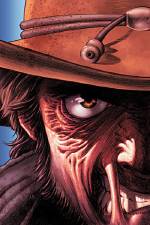 Hex’s world was filled with the greedy, the immoral and the amoral. Examples abound in his recent Showcase Presents volume. In one story, a cute, bumbling sheriff with a pretty little lady love sets off on the trail of violent thieves, joined by a protective Hex. In short order, Hex found that the sheriff was in on the gang’s crimes, seeing another woman on the side, and ready to kill Hex to keep it all secret. In another story, a young boy sold out Hex to a gang of killers for a quarter. A story about a corrupt tollbooth owner showed two children drown in swamp muck on-panel. Hex later finding the corpse of their mother rotting in a lime pit. It’s a cold, hard place, that West.
Hex’s world was filled with the greedy, the immoral and the amoral. Examples abound in his recent Showcase Presents volume. In one story, a cute, bumbling sheriff with a pretty little lady love sets off on the trail of violent thieves, joined by a protective Hex. In short order, Hex found that the sheriff was in on the gang’s crimes, seeing another woman on the side, and ready to kill Hex to keep it all secret. In another story, a young boy sold out Hex to a gang of killers for a quarter. A story about a corrupt tollbooth owner showed two children drown in swamp muck on-panel. Hex later finding the corpse of their mother rotting in a lime pit. It’s a cold, hard place, that West.
The worldview of Jonah Hex isn’t sophisticated. “The whole world ain't nuthin but a hooerhouse” is hardly a groundbreaking idea in and of itself. But it was unusual for both comics and westerns, entertainments notorious for clearcut black-hat villains and white-hat heroes, where virtue won out and everything was always fine in the end. By contrast, Hex’s gray-hat world was confusing and cruel, where good men were warped into villains by necessity and bad men often got away with their crimes.
In the seventies, Superman and Batman comics told you that bad men wore silly costumes, gave obvious clues to their intentions, and were always stopped by the forces of good. A kid could find issues of Superman Family, Batman Family, and super-teams a’plenty, and there he would find brotherhood and clean-cut adventure. On that same spinner rack, Jonah Hex told kids that the world was a treacherous place, everybody looks out for number one, and that when it matters, we all walk alone.
------------------
Will Munny: Hell of a thing, killin' a man. Take away all he's got and all he's ever gonna have.
The Schofield Kid: Yeah, well, I guess he had it comin'.
Will Munny: We all got it comin', kid.
--Unforgiven
------------------
Constant messages of shiny hope and glowing optimism feel false after a while. Hex was a counterbalance to regular comics, a recognition of the unsavory side of existence. Rather than wallow in power fantasies of conquest with Superman or the Legion of Super-Heroes, the Hex reader wallowed in dark fantasies of alienation. Marinating in a stew of cheap cynicism can be a hell of a lot of fun.
Both the new ongoing Jonah Hex series and the recently-published Showcase Presents volume reprinting his early years are worth the time and money. Buy ‘em, fanboys, and enjoy the bitter taste of a world long gone loco.
------------------
Little Bill Daggett: I don't deserve this... to die like this. I was building a house.
Will Munny: Deserve's got nothin' to do with it.
Little Bill Dagget: I'll see you in hell, William Munny.
Will Munny: Yeah.
--Unforgiven
-----------------
 Jonah Hex was a killer. He’d kill to fulfill his job, and often he killed to carve out a little justice. Yet there’s a difference between him and the killer vigilantes of comics set in the modern era, such as the Punisher.
Jonah Hex was a killer. He’d kill to fulfill his job, and often he killed to carve out a little justice. Yet there’s a difference between him and the killer vigilantes of comics set in the modern era, such as the Punisher.The Punisher’s stories are also filled with horrible crimes and murderous retribution, but they center on a different idea. The story of the Punisher is, at its heart, the story of a good man’s fall into hell. Frank Castle’s world is forever split between the Good Life of before, when order and love reigned, and the Nightmare World that an act of senseless violence threw him into, where all is chaos and hate. The Punisher kills to restore order to the world and to give himself the satisfaction of punishing those he feels to be evil.
Hex’s world was of a wholly different substance. Jonah had no fall from grace, no lost golden age. He was not trying to restore order to a world gone mad. The heart of Hex's story is that the world was always mad, and Jonah had to live in it. Hex was never on a great moral quest; he was just trying to get by.
He was decent and honorable in his way, simply because that’s who he was. A form of decency was innate to him, something he couldn't ignore even when he wanted to. And therefore he killed, because sometimes his world required that a decent man kill.
-----------------
Mordecai: What happens after?
The Stranger: Hmm?
Mordecai: What do we do when it's over?
The Stranger: Then you live with it.
--High Plains Drifter
------------------
 Hex’s world was filled with the greedy, the immoral and the amoral. Examples abound in his recent Showcase Presents volume. In one story, a cute, bumbling sheriff with a pretty little lady love sets off on the trail of violent thieves, joined by a protective Hex. In short order, Hex found that the sheriff was in on the gang’s crimes, seeing another woman on the side, and ready to kill Hex to keep it all secret. In another story, a young boy sold out Hex to a gang of killers for a quarter. A story about a corrupt tollbooth owner showed two children drown in swamp muck on-panel. Hex later finding the corpse of their mother rotting in a lime pit. It’s a cold, hard place, that West.
Hex’s world was filled with the greedy, the immoral and the amoral. Examples abound in his recent Showcase Presents volume. In one story, a cute, bumbling sheriff with a pretty little lady love sets off on the trail of violent thieves, joined by a protective Hex. In short order, Hex found that the sheriff was in on the gang’s crimes, seeing another woman on the side, and ready to kill Hex to keep it all secret. In another story, a young boy sold out Hex to a gang of killers for a quarter. A story about a corrupt tollbooth owner showed two children drown in swamp muck on-panel. Hex later finding the corpse of their mother rotting in a lime pit. It’s a cold, hard place, that West.The worldview of Jonah Hex isn’t sophisticated. “The whole world ain't nuthin but a hooerhouse” is hardly a groundbreaking idea in and of itself. But it was unusual for both comics and westerns, entertainments notorious for clearcut black-hat villains and white-hat heroes, where virtue won out and everything was always fine in the end. By contrast, Hex’s gray-hat world was confusing and cruel, where good men were warped into villains by necessity and bad men often got away with their crimes.
In the seventies, Superman and Batman comics told you that bad men wore silly costumes, gave obvious clues to their intentions, and were always stopped by the forces of good. A kid could find issues of Superman Family, Batman Family, and super-teams a’plenty, and there he would find brotherhood and clean-cut adventure. On that same spinner rack, Jonah Hex told kids that the world was a treacherous place, everybody looks out for number one, and that when it matters, we all walk alone.
------------------
Will Munny: Hell of a thing, killin' a man. Take away all he's got and all he's ever gonna have.
The Schofield Kid: Yeah, well, I guess he had it comin'.
Will Munny: We all got it comin', kid.
--Unforgiven
------------------
Constant messages of shiny hope and glowing optimism feel false after a while. Hex was a counterbalance to regular comics, a recognition of the unsavory side of existence. Rather than wallow in power fantasies of conquest with Superman or the Legion of Super-Heroes, the Hex reader wallowed in dark fantasies of alienation. Marinating in a stew of cheap cynicism can be a hell of a lot of fun.
Both the new ongoing Jonah Hex series and the recently-published Showcase Presents volume reprinting his early years are worth the time and money. Buy ‘em, fanboys, and enjoy the bitter taste of a world long gone loco.
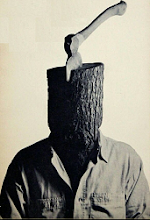
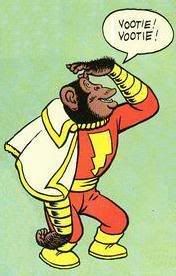
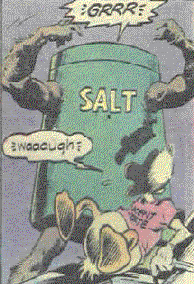
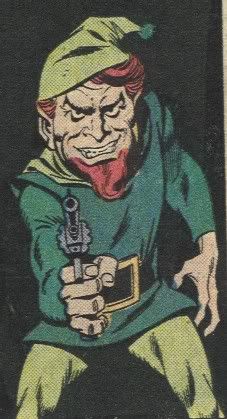

1 Comments:
Fabulous! I LOVE Jonah Hex and have for years. I'm so glad that the powers that be, decided to bring him back. The two mini-series by Joe Lansdale and Tim Trueman are also excellent, although with a LOT of dark humor.
By SallyP, at 11:44 AM
SallyP, at 11:44 AM
Post a Comment
<< Home